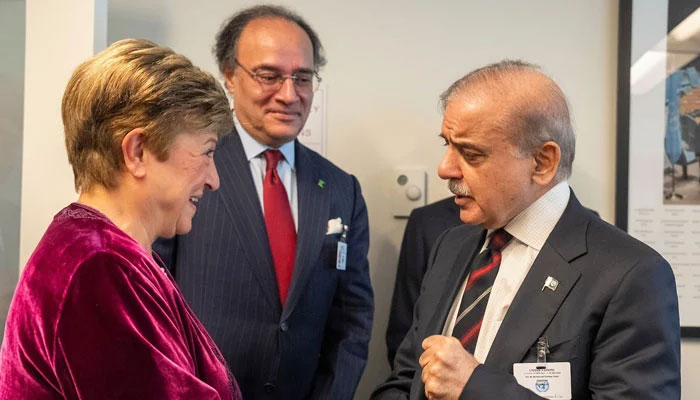To opt for mini budget or slash expenditure: Government strategizes ahead of IMF meetings
Govt may unveil mini budget or reduce expenditure to strike a balance in achieving agreed fiscal deficit
ISLAMABAD: The Shehbaz Sharif-led government has kick-started preparations for holding crucial parleys with the upcoming IMF staff mission and is all set to finalise a strategy this weekend.
In the case of mini budget, there are seven proposals for hiking tax rates on different sectors but the FBR is all set to recommend to the government not to increase tax rates amid signs of recovery from sluggish economic activities and reducing inflationary pressures. “The government is going to firm up its strategy this weekend for holding negotiations with IMF Staff Mission, led by Nathan Porter, who are scheduled to pay a visit to Islamabad from November 11-15, 2024,” top official sources confirmed while talking to The News on Thursday.
There are two options available to Pakistani authorities. They may unveil a mini budget or reduce expenditure to strike a balance in achieving the agreed fiscal deficit and primary balance targets. Now it is a test of the economic managers how they can forcefully convince the government to reduce its expenditures instead of further suffocating the economy by unveiling a mini budget.
The FBR has already faced a revenue shortfall of Rs189 billion in the first four months of the current fiscal year. It is projected that this revenue shortfall will go up to Rs321 billion in the first half of the current fiscal year. The FBR thinks that the government must make an effort to convince the IMF to slash the revenue collection target of Rs12,913 billion keeping in view changes that occurred in nominal growth and reduction in LSM growth and imports. However, the IMF might not extend its support for a reduced target of FBR.
Pakistan has given a written commitment that in case of revenue shortfall, there will be a contingency plan to raise tax revenues. “Should revenue collection underperform, contingency measures will be implemented in consultation with IMF staff with priority on increases in withholding and excise taxes. Should the 3-month rolling average revenue collection fall short of the projected target by 1 per cent, in consultation with IMF staff, Pakistan will evaluate the adoption of one or more of the following contingency measures: (i) increase advance income tax on import of machinery by 1 percentage point, expected collection of Rs2 billion per month; (ii) increase advance income tax on import of raw materials by industrial undertakings by 1 percentage point, expected collection of Rs3.5 billion per month; (iii) increase advance income tax on import of raw materials by commercial importers by 1 percentage point, expected collection of Rs1 billion per month; (iv) increase withholding tax on supplies by 1 percentage, expected collection of Rs1 billion per month; (v) increase withholding tax on services by 1 percentage point, expected collection of Rs0.5 billion per month; (vi) increase withholding tax on contracts by 1 percentage point, expected collection of Rs0.5 billion per month; and (vii) increase FED on aerated and sugary drinks by 5 percentage point, expected collection Rs2.3 billion per month.”
With all these seven measures, the FBR will be able to generate around Rs20 billion revenue increase every month, but the shortfall was more on average monthly basis. In such scenario, it will be a million-dollar question how the government will convince the IMF for correction measures without announcing any mini budget.
-
 Fresh Details Of King Charles, Queen Camilla's US Visit Emerge Amid Andrew Investigation
Fresh Details Of King Charles, Queen Camilla's US Visit Emerge Amid Andrew Investigation -
 Iran 'set To Buy' Chinese Carrier-killer Missiles As US Forces Gather In Region
Iran 'set To Buy' Chinese Carrier-killer Missiles As US Forces Gather In Region -
 Prince Harry And Meghan Unlikely To Meet Royals In Jordan
Prince Harry And Meghan Unlikely To Meet Royals In Jordan -
 Hero Fiennes Tiffin Shares Life-changing Advice He Received From Henry Cavill
Hero Fiennes Tiffin Shares Life-changing Advice He Received From Henry Cavill -
 Savannah Guthrie's Fans Receive Disappointing News
Savannah Guthrie's Fans Receive Disappointing News -
 Prince William Steps Out For First Solo Outing After Andrew's Arrest
Prince William Steps Out For First Solo Outing After Andrew's Arrest -
 Jake Paul Chooses Silence As Van Damme Once Again Challenges Him To Fight
Jake Paul Chooses Silence As Van Damme Once Again Challenges Him To Fight -
 Google Disrupts Chinese-linked Hacking Groups Behind Global Cyber Attacks
Google Disrupts Chinese-linked Hacking Groups Behind Global Cyber Attacks -
 Four People Killed In Stabbing Rampage At Washington Home
Four People Killed In Stabbing Rampage At Washington Home -
 Meghan Pushes Prince Harry Into Territory That’s Dangerous To His Brand: ‘She Isn’t Hearing A Word Of It’
Meghan Pushes Prince Harry Into Territory That’s Dangerous To His Brand: ‘She Isn’t Hearing A Word Of It’ -
 Christina Applegate Reflects On Lasting Impact Of Being Molested In Childhood
Christina Applegate Reflects On Lasting Impact Of Being Molested In Childhood -
 Martin Short Makes Big Decision Following Tragic Death Of Daughter
Martin Short Makes Big Decision Following Tragic Death Of Daughter -
 Antarctica’s Mysterious ‘gravity Hole’: What’s Behind The Evolution Of Earth’s Deep Interior?
Antarctica’s Mysterious ‘gravity Hole’: What’s Behind The Evolution Of Earth’s Deep Interior? -
 Hilary Duff Addresses Ashley Tisdale's 'toxic Mom Group' Claims And Matthew Koma's Firey Response
Hilary Duff Addresses Ashley Tisdale's 'toxic Mom Group' Claims And Matthew Koma's Firey Response -
 Jack Hughes's Proximity To Trump Angers Tate McRae Fans
Jack Hughes's Proximity To Trump Angers Tate McRae Fans -
 Neve Campbell Opens Up About Her 'difficult Decision' To Not Sign 'Scream 6'
Neve Campbell Opens Up About Her 'difficult Decision' To Not Sign 'Scream 6'




